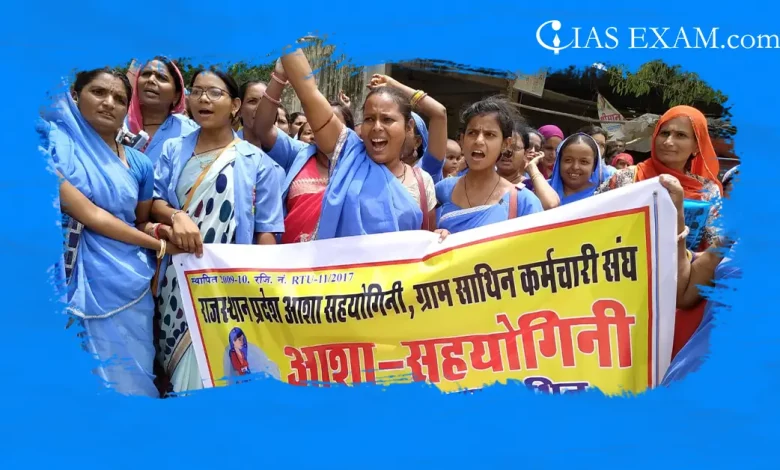Daily Current Affairs for UPSC
ASHA workers being Overworked and Underpaid
Syllabus- Society [GS Paper-1]

Context
Recently a study highlights the marginalization of ASHA workers for being Overworked and Underpaid.
ASHA workers
- ASHA workers are volunteers from within the community who are skilled to provide data and aid people in getting access to services of various healthcare schemes of the government.
- They act as a bridge connecting marginalized groups with facilities together with primary health centers, sub-centres and district hospitals.
- The position of these network health volunteers under the National Rural Health Mission (NRHM) was first established in 2005.
Eligibility for ASHA workers
- ASHA needs to primarily be a woman resident of the village married/ widowed/ divorced, preferably in the age group of 25 to 45 years.
- She ought to be a literate woman with due preference in selection to those that are certified up to 10th standard anywhere they are involved and to be had in suitable numbers.
- This may be comfortable only if no suitable person with this qualification is available.
Roles and duties of ASHA workers
- Facilitating access to health care services.
- Building awareness about health care entitlements in particular amongst the terrible and marginalized.
- Promoting healthy behaviors and mobilizing for collective movement for higher health outcomes.
- Meeting health care needs in the area.
Challenges faced by ASHA workers
- Triple Shift: ASHA workers undergo a triple shift encompassing duties at home, in the community, and at health centers, leading to severe exhaustion and time constraints.
- Layers of marginalization: ASHAs face intersecting power dynamics of gender, caste, and informal economic system, exacerbating their marginalization within the system.
- Limited Autonomy: ASHAs have limited control over their time, price range, and properly-being, highlighting their lack of autonomy in the healthcare system.
- Erratic Meals: ASHAs enjoy erratic meal schedules and frequently receive the least priority in meals allocation within their families, reflecting broader gender inequalities in India.
- Violence Embedded in Role: Economic, bodily, and psychological violence is embedded within the ASHAs’ position, perpetuated by a system that fails to understand their contributions.
- Occupational Hazards Denied: ASHAs are taken into consideration as volunteers and denied recognition as ‘workers’. Hence risks such as extreme heat, further compromising their health and safety.
- Vulnerability to Health Issues: Poor ingesting habits, irregular meals, and lack of nutritious meals make ASHAs susceptible to malnutrition, anemia, and non-communicable diseases.
- Financial Strain: ASHAs regularly experience behind schedule wages and incur out-of-pocket expenses for process-associated fees, diminishing their potential to have the funds for healthcare for themselves.
- Lack of Status as Healthcare Workers: ASHAs aren’t accorded the reputation of healthcare workers, which underpins most of the challenges they face in the system.
Government Steps
- In the Interim Budget 2024-2025, the Central government announced to offer loose medical insurance cover for all ASHAs and Anganwadi workers and helpers under the Ayushman Bharat Scheme.
- In 2018, the Ministry of Health and Family Welfare approved an ASHA advantage package deal, imparting coverage for accidents, deaths and incapacity.
Way Ahead
- A chronic, systematic funding to reinforce the ASHA program is inextricably connected to advancing India’s child and maternal health consequences.
- Without coverage adjustments, ASHAs stay framed as mere volunteers, neglecting their rights and welfare.
- India needs to acknowledge ASHAs as full-fledged workers, supplying them with respectable pay and right care to ensure their physical and emotional health, ultimately benefiting women, kids, and society as a whole.
Source: The Hindu
UPSC Mains Practice Question:
Q.With reference to the National Rural Health Mission, which of the following are the jobs of ‘ASHA’, a trained community health worker? (2012)
- Accompanying women to the health facility for antenatal care checkup
- Using pregnancy test kits for early detection of pregnancy
- Providing information on nutrition and immunisation.
- Conducting the delivery of baby
Select the correct answer using the codes given below:
a. 1, 2 and 3 only
b. 2 and 4 only
c. 1 and 3 only
c. 1, 2, 3 and 4
Ans: “a”





.png)



